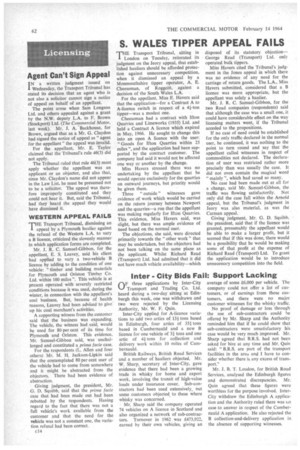S. WALES TIPPER APPEAL FAILS
Page 64

If you've noticed an error in this article please click here to report it so we can fix it.
THE Transport Tribunal, sitting in
London on Tuesday, reiterated its judgment on the Jeory appeal, that established hauliers should be afforded protection against unnecessary competition, when it dismissed an appeal by a Monmouthshire tipper operator, A. E. Cheeseman, of Roggeitt, against a decision of the South Wales L.A.
For the appellant, Miss E. Havers said that the application—for a Contract A to A-licence switch in respect of a 41-ton tipper—was a modest one.
Cheeseman bad a contract with Ifton Quarries and Limeworks (1935) Ltd. and held a Contract A licence which expired in May, 1966. He sought to change this into an open A licence with the user: "Goods for Ifton Quarries within 25 miles ", and the application had been supported by the contract customer. The company had said it would not be affected one way or another by the change.
Miss Havers stressed there was no undertaking by the appellant that he would operate exclusively for the quarries on outward journeys, but priority would be given them.
Three " outside " witnesses gave evidence of work which would be carried on the return journey between Newport and the quarries—a run that the appellant was making regularly for Ifton Quarries. This evidence, Miss Havers said, was slight, but there was ample evidence of need based on the normal user.
The objections, she said, were directed primarily towards the "other work" that may be undertaken, but the objectors had not been talking on the same plane as the applicant. Whilst Richard Read (Transport) Ltd. had admitted that it did not have much vehicle availability—which
disposed of its statutory objection— George Read (Transport) Ltd. only operated bulk tippers.
Miss Havers cited the Tribunal's judgment in the Jones appeal in which there was no evidence of any need for the carriage of return goods. The L.A., Miss Havers submitted, considered that a B licence was more appropriate, but the appellant was solely a haulier.
Mr. J. R. C. Samuel-Gibbon, for the two Read companies (respondents) said that although the case was a small one, it could have considerable effect on the way licensing matters went, if the Tribunal acceded to the propositions.
If no case of need could be established for the only traffic declared in the normal user, he continued, it was nothing to the point to turn round and say that the appellant called witnesses in respect of commodities not declared. The declaration of user was restricted rather more precisely than was usually the case. It did not even contain the magical word "mainly ", which had saved so many.
No case had been made out at all for a change, said Mr. Samuel-Gibbon, the traffic was flowing satisfactorily. Not only did the case fall within the Arnold appeal, but the Tribunal's judgment in Jeory was also material, as was the Carman appeal.
Giving judgment, Mr. G. D. Squibb, the president, said that if the licence was granted, presumably the appellant would be able to make a larger profit, but it seemed that if this was done, There would be a possibility that he would be making some of that profit at the expense of Richard Read (Transport) Ltd. To grant the application would be to introduce unnecessary competition into the field.
















































































































































































